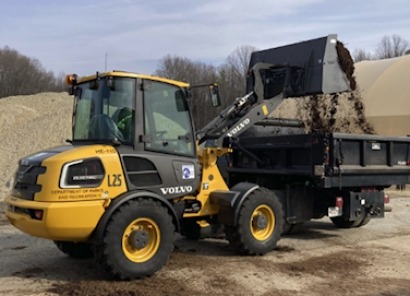
"Our teams are excited about these machines because of our strong focus on reducing our carbon footprint,” said Andrew Phillips, Division Chief, Facility Services, Department of Parks and Recreation, Prince George’s County. “We believe in leading by example and our mission is to preserve, enhance and protect natural spaces, so these machines will really help us with those efforts.”
Prince George’s County, with a population of around 1 million people, borders D.C. on the east and has more than 28,000 acres of recreational areas and hundreds of miles of trails.
A major focus for the parks department this year is to improve ballparks, playgrounds and trails — and their new L25 Electric compact wheel loader and ECR25 Electric compact excavator are already on the job.
“We’re using the loader for moving mulch and soil on those projects, and even in our own lot we use it for snow removal and mowing,” said Phillips. “These machines will also be great for indoor jobs in office buildings, in higher density areas and where wildlife lives because of how quiet they are.”
Government fleets are among the most eager early adopters of electric construction equipment as they seek solutions to support sustainability initiatives and meet demands from the public and elected officials.
“M-NCPPC was the first government agency in North America to purchase one of our electric machines, and then quickly added a second to their fleet. We’re happy to support their goals to reduce emissions for the people who live, work and play in their communities,” said Stephen Roy, president of Region North America, Volvo CE.
Preparing for the Future
Phillips says M-NCPPC follows the three pillars of the National Recreation and Park Association (NRPA): health and wellness, equity and conservation. The state of Maryland is also working on some noise and emissions ordinances they will need to follow.
By electrifying as much equipment as they can now, Phillips believes they’ll be ahead of any upcoming regulations. They’re also doing it because they feel it’s simply the right thing to do.
“We are all stewards of the environment and need to be seeking long-term gains over short-term thrills,” Phillips said. “We also have to keep in mind who we are serving and be fiscally responsible to them.”
Any agency purchases over $10,000 must be competitively bid, which is why M-NCPPC used a cooperative purchasing resource called Sourcewell. Phillips knew that Volvo CE also worked with Sourcewell, so he said it was a painless process that got them a sizable discount on the machines.
“We can just tell our dealer rep what we’re looking for, and they’ll provide a quote,” he said. “When we had trouble with the previous brand we used, our local Volvo rep took us to jobsites to observe their equipment, and we’ve never looked back. When we told him how interested we are in electric, he called us as soon as they became available.”
That rep, Nick Lepore of McClung Logan Equipment Co., helped Phillips’ team grow their Volvo fleet over the past few years to three large excavators and the two new electric compact machines, while also incorporating Customer Support Agreements to keep everything running smoothly.
Phillips says his equipment operators have been impressed by how quiet the electric machines are and how instant the torque is. They’ve told him that they are easy to use, maintenance is simple, and the performance is just as good as a conventional diesel machine.
“We requested some additional training for our mechanics to learn about the electrical components, and any fears they had were put to rest,” said Phillips.
Because the L25 Electric wheel loader and ECR25 Electric excavator do not have diesel engines, maintenance is significantly simpler and less expensive. Volvo CE says the lifetime of battery-electric components should be equal to or better than that of the diesel engine on a conventional machine.
Prioritizing the Planet
Volvo CE electric machines can be charged using the same type of 120- and 220-volt outlets that are found in many homes, as well as with a growing number of mobile charging products. M-NCPCC worked with local power companies to install charging stations on the department campus, and a solar farm and greenhouse-turned-learning-center further demonstrate the county’s commitment to their alternative power transition and the environment as a whole.
“We work with our public schools to teach kids about growing food, how solar power works and all kinds of great things,” said Phillips. “Our campus even has solar-powered outdoor workstations where people can come plug in their computers or phones and work out in nature.”
The Prince George’s County parks team has two full-time positions dedicated to sustainability, and they are working on grant applications and state funding for various regenerative infrastructure projects.
“Collaboration is what will make these changes successful,” said Phillips. “We know there’s no time to waste, and we’re excited that electrification is finally happening in the heavy equipment realm. I can’t wait to try out even bigger machines with alternative power sources.”
He said Volvo CE was a logical choice for them to turn to because of the OEM’ssix-machine lineup of electric compact equipment. Volvo CE also recently announced an electric conversion for a mid-size wheel loader, and announced at CONEXPO that itsmid-size electric excavator is starting customer pilots in the U.S., including with Waste Management.

